- Home
- Andrew McGahan
The Ocean of the Dead: Ship Kings 4 Page 18
The Ocean of the Dead: Ship Kings 4 Read online
Page 18
In the heavy air flew the prey of such creatures: strange insects, beheld before by no one in the fleet. Gangling stick things with gauzy wings and barbed, clinging legs. Mites coloured purple and red which whined and stung, and which left the wounds bleeding, as might a leech. Droning hornets that alighted on the sides of the ships and crawled into the lower decks, where they spun funnelled webs in corners, in which to lay eggs.
Fidel was as intrigued as ever. ‘None of these species,’ he enthused to Dow and Jake and Boiler, ‘exist in the northern half of the world. Nor have I yet spied a single plant or creature of the northern world existing here. Therefore I think we have passed into a whole new realm of life, unique to the Barrier, and quite unrelated to our own. The Sterile Sea, as I call it, must form the divide between the two worlds, a dead zone that cannot be broached by species from either side. No doubt, if we reach the south half of the Doldrums, we will have to cross a second sterile boundary before we enter normal seas again.’
‘Is it dangerous to us, this unique realm?’ Boiler asked. ‘The Chloe is becoming infested with these foreign insects, for instance, and many folk are getting bitten. What if they are poisonous?’
Fidel shrugged. ‘Only time will tell. For all their strangeness, these creatures are natural – it’s just their environment that makes them so alien. Still, some will probably prove venomous or otherwise harmful, just as we have deadly snakes and such in the world we know.’
‘It’s not snakes or insects I fear,’ commented Jake. ‘The greater worry is how much we’ve been slowed these last few days. Our speed here can barely be half what it was before we struck these weeds, and yet we’re burning more fuel to achieve even that. What will that do to your calculations, Fidel?’
The old scholar nodded gravely. ‘Nothing good. I reckoned our total at only fifteen miles yesterday – yet the fools on the New World still somehow claimed over thirty. But no matter how you tally it, we’re in trouble. After all, we’re approaching our twentieth day under tow. By now we should be almost halfway across the inner Barrier, and approaching the equator. But we are vastly short of that – four hundred miles short, by my count.’
But the expedition held onwards. Over the next two days they did in fact make better progress, for the crews on the boats became more practised at steering through the weed without becoming entangled. Fidel figured their advance as twenty and then twenty-two miles.
But it was hardly improvement enough, and on the third day they struck a new species of weed, the densest yet. So thickly did it crowd on the surface that in places it formed dense mats, the upper fronds raised clear of the water, and so tightly packed as to imitate solid land, each mat like a floating island. Upon these rafts many scurrying creatures and insects appeared to live without any recourse to the water or to swimming at all.
Sometimes such islands could be steered around, but other times they clustered together in archipelagos which blocked all routes south, and the only way forward was for the attack boats to nudge island after island aside by the power of their engines. But it was slow work.
And now a deadly milestone arrived: the twentieth day dawned since they had begun the towing. More than half of their allotted thirty nine days were gone, and yet they had failed to reach the midpoint of the inner Barrier, or even come close to it. Worse, they had used up more than half of their oil. Jake estimated they would now run dry in seventeen days more at most.
All that twentieth day, thus, Dow and Fidel watched the New World anxiously for a signal. They had sent a report at dawn, listing their concerns. Surely Diego would not ignore it; surely he would call a halt now, and hold council to discuss the worsening situation. Or did he not understand the danger? Had his own navigators, through either incompetence or through intentional deceit, so completely hidden the truth from him?
It wasn’t until nightfall that a reply came, a boat setting out in the gloaming from the New World. It bore only Diego’s usual errand-boy of a lieutenant, who was named Florenze. ‘His Highness is aware of your concern over oil consumption,’ this officer declared to Dow and Fidel in the Chloe’s Great Cabin. ‘But you need not fear; we’ve almost reached the halfway point as scheduled, and so can continue with confidence.’
‘The halfway point?’ enquired Fidel in disbelief. ‘You seriously claim that we’re at the equator already?’
The young man smiled. ‘No. But it is not far off – no more than sixty miles away, by our calculations. Another two days only and we will cross into the southern hemisphere. And if we continue to use our fuel at the same rate then we shall not run dry until we are within a mere one hundred and fifty miles of the southern limit of this inner zone. And though it will be laborious, we can cover those final miles safely enough by oar.’
Fidel was shaking his head slowly. ‘And if I tell you that in fact we’re still over three hundred miles away from the equator, and that if we continue this way we will end up as much as seven hundred miles short of the outer Doldrums? What then? Does Diego think we can row the ships that far?’
‘What His Highness thinks,’ replied Florenze, ‘is that certain fainthearted members of this expedition will say anything – even falsify their figures – to convince others to turn back. But he will not be cowed. In any case, the scapegoat Uyal has assured him that there’s nothing to fear in regards to our oil supply.’
Dow studied his guest in surprise. ‘Uyal said that? Uyal said our oil won’t run out?’
‘Not in those words, no.’
‘In what words, then?’
The lieutenant shifted stiffly, but answered even so. ‘When asked to pronounce on the question, Uyal said this – It is not a lack of oil that will decide the matter, Your Highness, so do not hesitate to spend it.’
Dow and Fidel exchanged a wondering glance.
‘Thus reassured,’ Florenze continued, ‘His Highness has declared it, and I say it to you now: both ships will continue south.’
‘At point of cannon, if need be?’ asked Dow.
‘Surely it need not come to that,’ said Florenze. ‘After all, to go forward is what you want too, isn’t it, Captain Amber?’
To which Dow had no ready reply. To go forward, yes – why else had they come here at all, if not to pass through to the other side? But to press on when in the judgement of their best navigator they could not possibly reach their goal; to press on when every mile forward now would be a mile they could not retreat when disaster came – to press on then felt like madness.
Had it been up to Dow, could he really have given such an order? He didn’t know. He couldn’t know. It was a question that could only be answered if the choice was actually his to make. And it wasn’t. The decision was Diego’s. And as the prince, in his wisdom or folly, was convinced that they should go on, the Chloe must obey, whether Dow willed it or not.
*
Thus the race began.
It was not a race any longer to the further side of the Barrier; the race was now merely against their diminishing oil supply, to see how far it would take them, and how short exactly of their goal they would fall.
It was a contest marked by no landmarks or waypoints, no stars, no moon, and only the vaguest impression of a sun. The weeds and floating islands might advance through the haze and pass by, but they were only replaced by others that were identical.
Nevertheless, at noon two days after the visit from Florenze, the New World let off a round of ceremonial cannon fire, a dozen guns booming dully into the hot silence of the Barrier. Dow had been forewarned, and watched on sourly: this was Diego’s celebration to mark their supposed crossing of the equator, and their arrival, the first of all mankind, in the southern hemisphere.
There was no such festivity on the Chloe. Fidel had not altered his conviction that the equator remained still nearly three hundred miles away. And, at best, they had only fifteen days of oil left now.
But Diego led them on, even though it was obvious to all now that their speed was dropping day by da
y, as the weed and the floating islands choked the sea ever more thickly. Eighteen miles one day, fifteen miles the next, fourteen the day after that – Fidel recorded each terrible figure in the log. A full week after they had supposedly passed over the equator, his combined total was less than a hundred miles travelled in that time, leaving them still two hundred short even of the halfway mark.
In contrast, Diego’s navigators declared that they were now far into the southern world, and advancing well. But Dow and Fidel could detect a growing desperation in the messages that came from the New World. On the tenth morning since the cannon salute, the daily orders from Diego insisted that a special watch be kept by the lookouts on the ocean ahead, as it was expected that the fleet would soon strike clear water again.
Fidel laughed blackly. ‘Fools. They think we are already drawing near to the southern Sterile Sea and the end of these inner waters. Well, they can watch all they like, they will see nothing but more weed yet.’
It was true. No open water appeared; if anything, the growth teemed all the more densely. And meanwhile, as a result no doubt of the biting insects and the fumes that crept up from the sea, sickness again struck the Chloe. Fevers and dysentery had been stalking the lower decks already, inevitable in such overcrowding: now new infections took hold. Sick bay overflowed, and soon followed the first deaths since the Miasma. First, a middle-aged woman whose lungs were congested beyond breathing. Next, a baby boy, coughing and blue; and the next again, a girl of only six, of the same disease.
But still the fleet crept on through the islands and weed. Thirty-four days in all had now passed under tow, leaving at best three days of oil remaining. According to the increasingly hollow assertions of Diego’s navigators they were making over thirty miles a day and should be some five hundred miles south of the equator. But by Fidel’s reckoning they were in fact at least forty miles north of the equator, and making barely fifteen miles a day. If only the gloomy Doldrums roof had lifted for a single hour in the night to reveal the stars, he might have proved his figures right. But the haze hung as thickly as ever, the ships blind within it, and in truth it was far too late anyway.
It was only a matter of waiting for the end now. For another two long days the boats heaved against the weeds and the floating islands – the latter having grown to monstrous size, some up to a hundred yards across, and so densely packed that they rose several feet above the sea. And one by one, from the holds of the ships, the last few barrels of precious whale oil were lifted free. By the thirty-seventh dawn, the holds were empty; only those barrels already on deck remained, enough maybe to feed the engines for a dozen hours more.
Faced with this awful truth, a mania seemed to grip Diego. The order came that all boats, including the reserves, must be deployed at once in the towing, all eight for the Chloe, all ten for the New World. They must push on faster while they could, and with all the strength they possessed. And Dow complied, even though he knew it was meaningless, for it was unbearable anymore to be patient, to creep along until the finish; the urge for a last wild dash was irresistible, the frenzy of a dying man.
For half a day they forged on, eighteen engines thrashing madly at the clotted water and at the tangled weeds – and yet for all the din and fury, they covered no more than another seven miles perhaps. Then even the barrels on deck were empty, and there was only the oil in the boats’ tanks remaining, and the watchers on each ship could only stare numbly and wait.
At mid-afternoon, the end came. First one boat signalled that its engine had died, and then another. In the space of a quarter hour the rest followed, the last few craft still pulling vainly on their lines until the very death. Then it was done, and all the ropes hung slack.
The boats lay like dead leaves about the ships, and the weeds and islands seemed to draw themselves inwards, as if relishing their prey. A silence settled that no one had experienced since the towing had begun. Not an engine throbbed, not a line cracked or groaned, and the heat weighed down in reminder that the air had never moved here, and never would . . .
On the Chloe’s high deck, Fidel made his final calculations and jotted them in the log. He smiled ironically at Dow. ‘Well, with the final few miles we’ve made today, I’d say that puts us as near to dead centre upon the equator as it’s possible for me to estimate.’
Dow nodded, sharing the irony – and the bitterness. For all their intentions to not become trapped like other ships before them, here they were, trapped. And for all the cleverness of their engines and oil, all they had achieved was to place themselves in the worst position conceivable within the Barrier, exactly halfway across, and exactly as far from hope or wind as it was possible to be, whether they now advanced or retreated. Whichever way they chose, north or south, it would mean the agony of a thousand miles of rowing.
He glanced across to the New World. Diego was on his high deck in conversation with his navigators, all of them staring about grimly. Well, this disaster was their handiwork. Dow hoped they were pleased with themselves. (And yet, whispered a doubt in his mind, if Dow himself had remained in charge, would the result have been any different?)
But then his gaze was drawn to another figure emerging onto the high deck. It was Nell – a surprise, for until now she had only ever appeared on the New World’s main deck. She had scrupulously avoided the high, as if she intended – so Dow believed anyway – to avoid any encounter with Diego there. And indeed she ignored him and his officers even now, only went to the forward rail and gazed out across the water at the useless clutter of the boats, and the great morass of islands and weeds.
Finally, she turned her gaze to the Chloe, and to Dow. And even across the fifty yards that separated them, Dow felt somehow that he could finally read what was in her eyes – and it was recognition.
She knew this place, this choked sea of the equator. She remembered it – for this was the home of her nightmare visions, this was the realm to which she had travelled in her fits and seizures.
And by her own foretelling, she would never leave here.
She seemed to sigh, then turned away. And as Dow stared, she went to Diego and bowed her head to him in apparent surrender.
8. VISITATIONS
As the hidden sun faded west into the murk, and dark ness advanced from all around, a boat came from the New World.
Dow watched as the craft struggled across the sea, its rowers straining in the weed-thick water, their oars barely able to break the heavy surface: a precursor and warning of the immense labour that now lay ahead of the fleet, if they were ever to escape this place.
But soon enough the boat’s passenger was escorted to the high deck. It was, as ever, Lieutenant Florenze. ‘His Highness suggests we use this night to prepare,’ he instructed, ‘and then in the morning begin towing by oar. The New World has eight wooden craft at the ready, cutters or skiffs, and Ignella of the Cave has informed the prince that the Chloe has six such boats.’
‘Aye,’ said Dow, ignoring the lurch in his heart at the reference to Nell. She and Diego, the two deep in conversation seemingly, had disappeared from the New World’s high deck an hour before. ‘Boats we have. But in which direction do we row? North or south? And how long does your prince think it will take us to reach the regions where winds might finally rise again?’
Florenze hesitated a moment under Dow’s cold stare, then recovered. ‘We continue south, of course. Our calculations have it that we lie some three hundred miles short of the beginning of the outer Doldrums. With the boats rowing hard, their crews on constant rotation by light and dark, we will surely cover ten miles a day, and hence traverse those three hundred miles in no more than a month. Slow progress, and uncomfortable, but both ships are sufficiently supplied, so there need be no terror of the task if we hold our nerve.’
Fidel laughed. ‘No terror? The true task is this: we’re a thousand miles from any wind, and that means at least one hundred days of rowing, even if we really can manage ten miles a day. A hundred days of hard labour, in thi
s heat, with our crews already dying of overcrowding and disease, even before they are forced to the oars. Your own navigators must know this, so why pretend? Or are you and they simply too afraid to tell it to Diego?’
Florenze flushed. ‘Whatever the truth, does it make any difference? Do you have any suggestion or hope other than to row southward?’
A fair riposte, Dow thought. Diego had committed them to this end beyond all protest now. After all, if going back or going on would be the same torment in any case, then the choice was plain.
He said, ‘We have no other suggestions. We’ll go on.’
‘Then we begin at dawn,’ said Florenze.
Jake Tooth, also standing by, spoke. ‘And what of the attack boats?’ Everyone’s gaze went to the sea, where the iron craft floated in a forlorn pack: the secret weapons that would defeat the Barrier, abandoned. ‘No order has been given yet to retrieve them – but if they remain in the water overnight, their hulls will be half eaten through by morning in this nicre-rich sea.’
‘What of it?’ enquired the lieutenant. ‘Let them be eaten. Their engines are of no use to anyone now, unless you imagine we’ll happen upon a new bounty of refined whale oil somewhere in the wastes ahead? That unlikely marvel aside, there’s no purpose in taking such heavy craft back on board – they would be only more dead weight for the rowers to pull.’
Fidel shook his head. ‘Still, such products of mechanical advancement should not be discarded too lightly. Presumably there will be whales in the oceans of the New World, so why not whale oil one day, when a refinery is built by the settlers? Surely a few of the boats at least should be kept, as examples that future technicians in the New World may wish to copy.’
Florenze waved a hand. ‘Be it on your own heads, then. I doubt Prince Diego will care either way, as long as you can keep up with us tomorrow!’

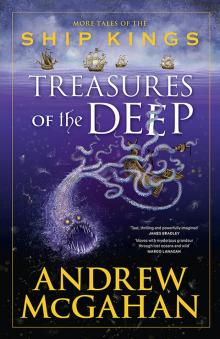 Treasures of the Deep
Treasures of the Deep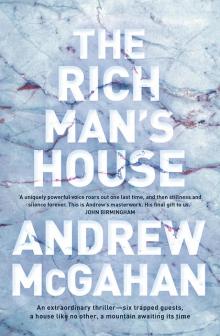 The Rich Man’s House
The Rich Man’s House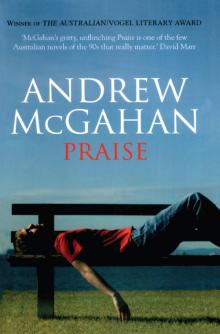 Praise
Praise The White Earth
The White Earth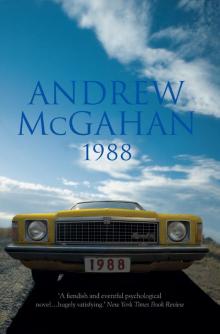 1988
1988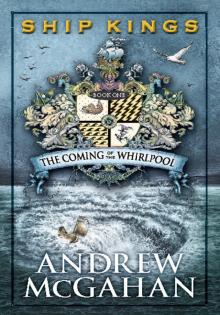 The Coming of the Whirlpool
The Coming of the Whirlpool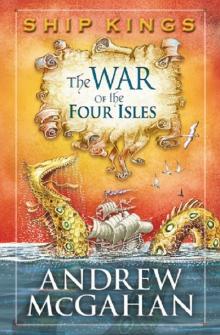 The War of the Four Isles
The War of the Four Isles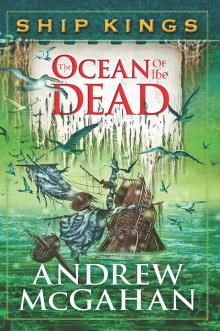 The Ocean of the Dead: Ship Kings 4
The Ocean of the Dead: Ship Kings 4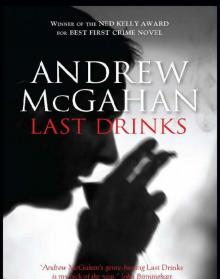 Last Drinks
Last Drinks Wonders of a Godless World
Wonders of a Godless World Underground
Underground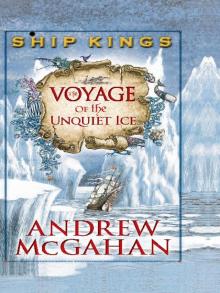 The Voyage of the Unquiet Ice
The Voyage of the Unquiet Ice